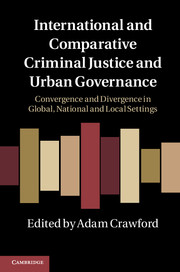 International and Comparative Criminal Justice and Urban Governance
International and Comparative Criminal Justice and Urban Governance from PART 1 - International criminal justice
Published online by Cambridge University Press: 05 June 2011
Since 2005 the Grand Chamber of the European Court of Human Rights (ECtHR) has given a series of ground-breaking judgments in which it has addressed the difficult question of the purpose of imprisonment while seeking to resolve complex practical issues, such as prisoners' rights to vote, artificial insemination by prisoners and the acceptability of whole life sentences. This chapter analyses some of these judgments closely. It points out that, while the judges often come to radical conclusions, they sometimes attempt to soften the blow by allowing states a margin of appreciation in instances where it is arguably inappropriate to do so. The chapter reflects on whether this is merely a short-term political strategy or whether this approach may undermine the considerable potential of the Grand Chamber to set a conceptual framework for prison law and policy applicable throughout Europe. It does so by considering the impact of these judgments on the penal reform process in England and Wales.
Introduction
It is the point of departure of this chapter – one that is regarded as obvious by human rights lawyers (who sometimes exaggerate its significance) – that courts applying general human rights standards can shape penal policy in crucial ways. Social scientists conversely, often do not pay sufficient attention to the subtleties of the judicial development of penal values, but they are more sensitive to the difference between the pronouncements of the courts and actual changes to penal policies and practices.
To save this book to your Kindle, first ensure [email protected] is added to your Approved Personal Document E-mail List under your Personal Document Settings on the Manage Your Content and Devices page of your Amazon account. Then enter the ‘name’ part of your Kindle email address below. Find out more about saving to your Kindle.
Note you can select to save to either the @free.kindle.com or @kindle.com variations. ‘@free.kindle.com’ emails are free but can only be saved to your device when it is connected to wi-fi. ‘@kindle.com’ emails can be delivered even when you are not connected to wi-fi, but note that service fees apply.
Find out more about the Kindle Personal Document Service.
To save content items to your account, please confirm that you agree to abide by our usage policies. If this is the first time you use this feature, you will be asked to authorise Cambridge Core to connect with your account. Find out more about saving content to Dropbox.
To save content items to your account, please confirm that you agree to abide by our usage policies. If this is the first time you use this feature, you will be asked to authorise Cambridge Core to connect with your account. Find out more about saving content to Google Drive.